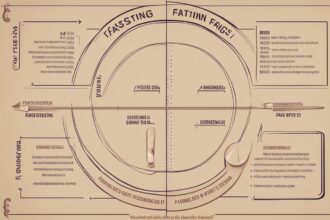Hey there, health enthusiasts! If you’ve ever wondered whether fasting or dieting is the better path to achieving your wellness goals, you’re in the right place. In this comprehensive fasting guide, we’re diving deep into the differences, benefits, and challenges of fasting versus traditional dieting. Whether you’re new to the concept of fasting or a seasoned pro looking for a refresher, this post will break down everything you need to know with practical tips and science-backed insights. Let’s explore how these two approaches impact weight loss, metabolic health, and overall well-being, so you can decide which method (or combination) works best for you.
What Is Fasting? A Beginner’s Overview
Fasting, at its core, is the voluntary abstention from food and sometimes drink for a specific period. It’s not just a modern trend—fasting has been practiced for centuries across cultures and religions for spiritual, mental, and physical benefits. Today, it’s gained popularity as a health strategy, often referred to as intermittent fasting (IF), where you cycle between eating and fasting windows. Common methods in any fasting guide include the 16:8 method (fast for 16 hours, eat during an 8-hour window) or the 5:2 approach (eat normally for 5 days, restrict calories on 2 days). Research shows fasting can promote weight loss, improve insulin sensitivity, and even support cellular repair through autophagy (Sutton et al., 2018). But it’s not a one-size-fits-all solution, and understanding how it works is key to success.
What Is Dieting? The Traditional Approach to Health
Dieting, on the other hand, typically involves a structured eating plan with specific rules about what, when, and how much to eat. Think of popular diets like keto, paleo, or low-calorie plans—they often focus on macronutrient balance or calorie restriction to achieve weight loss or health improvements. Unlike fasting, which emphasizes timing, dieting is more about content and quantity. While effective for many, studies suggest that long-term adherence to strict diets can be challenging, with many regaining lost weight due to unsustainable habits (Mann et al., 2007). So, how does this compare to fasting benefits outlined in a typical fasting guide? Let’s break it down further.
Key Differences Between Fasting and Dieting
While both fasting and dieting aim to improve health or manage weight, their approaches couldn’t be more different. Fasting is less about “what” you eat and more about “when” you eat, often leading to a natural reduction in calorie intake without obsessive tracking. Dieting, however, requires constant attention to food choices, portion sizes, and sometimes rigid rules. Fasting can also trigger unique metabolic benefits, like ketosis, where the body burns fat for fuel during extended fasts (Paoli et al., 2019). Meanwhile, dieting often relies on willpower to resist cravings, which can feel draining. Here are some core differences to consider when exploring a fasting guide versus a dieting plan:
- Fasting focuses on timing; dieting focuses on food selection.
- Fasting may enhance metabolic flexibility; dieting often targets specific nutrient goals.
- fasting can be easier to follow for some due to fewer food decisions; dieting requires consistent planning.
- fasting often involves periods of complete calorie abstinence; dieting usually allows continuous eating within limits.
Health Benefits: Fasting vs Dieting
Both fasting and dieting offer health benefits, but their impacts vary. Fasting, especially intermittent fasting, has been linked to improved blood sugar control, reduced inflammation, and even potential longevity benefits through mechanisms like autophagy, where cells recycle damaged components (de Cabo & Mattson, 2019). Dieting, particularly balanced plans like the Mediterranean diet, supports heart health and sustainable weight management when done right (Estruch et al., 2013). However, crash diets can lead to nutrient deficiencies or metabolic slowdown if not carefully planned. Let’s look at some specific benefits tied to each method as part of this fasting guide exploration:
- Fasting Benefits: May boost brain health, improve insulin sensitivity, and support fat loss (Mattson et al., 2017).
- Fasting Benefits: Can reduce oxidative stress and inflammation in the body.
- Dieting Benefits: Offers structured nutrition for targeted goals like muscle gain or heart health.
- Dieting Benefits: Provides flexibility in food choices depending on the diet type.
Challenges and Pitfalls to Watch Out For
Neither fasting nor dieting is without its hurdles. When following a fasting guide, beginners might struggle with hunger pangs, irritability, or overeating during eating windows if not mindful. Fasting isn’t suitable for everyone—pregnant individuals, those with certain medical conditions, or a history of eating disorders should consult a healthcare provider first. Dieting, meanwhile, often leads to “yo-yo” weight cycling if the plan is too restrictive or lacks long-term sustainability (Mann et al., 2007). It can also foster an unhealthy relationship with food if it’s tied to guilt or obsession. The key with both is balance—listening to your body and avoiding extremes. I’ve personally found that starting slow with fasting (like a 12:12 schedule) helps ease the transition, while with dieting, focusing on whole foods over processed junk makes a world of difference.
Practical Tips for Choosing Between Fasting and Dieting
So, how do you decide between fasting and dieting—or whether to combine them? It really comes down to your lifestyle, goals, and preferences. If you’re someone who hates meal planning or calorie counting, a fasting guide might be your best bet since it simplifies eating decisions. If you love cooking and experimenting with recipes, a structured diet could be more your speed. Personally, I’ve combined elements of both—using intermittent fasting a few days a week while following a balanced diet during eating windows. Here are a few tips to help you get started, whether you’re leaning toward fasting tips or dieting strategies:
First, assess your daily routine. fasting works well if you’re busy and can skip breakfast without issue, but if you’re an early riser who needs fuel, a diet plan might be better. Second, set realistic goals—don’t aim for drastic weight loss overnight with either method. Third, stay hydrated and prioritize nutrient-dense foods regardless of your choice. Fasting or dieting, your body needs vitamins, minerals, and energy to thrive. Lastly, don’t be afraid to experiment. Try a week of fasting, then a week of a flexible diet, and see what feels sustainable. Remember, health isn’t a race—it’s a lifelong journey.
In conclusion, whether you choose fasting, dieting, or a hybrid approach, the best path is the one you can stick to consistently. This fasting guide has hopefully shed light on the unique advantages and challenges of each method, from the metabolic perks of fasting to the structured nutrition of dieting. The science backs both as viable options for weight management and health improvement when done thoughtfully, but listening to your body is paramount. Have you tried fasting or dieting before? What worked for you? Drop your thoughts below—I’d love to hear your experiences as we all navigate this journey to better health together!
References
- de Cabo, R., & Mattson, M. P. (2019). Effects of intermittent fasting on health, aging, and disease. New England Journal of Medicine, 381(26), 2541-2551. https://doi.org/10.1056/NEJMra1905136
- Estruch, R., Ros, E., Salas-Salvadó, J., et al. (2013). Primary prevention of cardiovascular disease with a Mediterranean diet. New England Journal of Medicine, 368(14), 1279-1290. https://doi.org/10.1056/NEJMoa1200303
- Mann, T., Tomiyama, A. J., Westling, E., et al. (2007). Medicare’s search for effective obesity treatments: Diets are not the answer. American Psychologist, 62(3), 220-233. https://doi.org/10.1037/0003-066X.62.3.220
- Ageing Research Reviews, 39, 46-58. https://doi.org/10.1016/j.arr.2016.10.005
- Paoli, A., Bosco, G., Camporesi, E. M., & Mangar, D. (2019). Ketosis, ketogenic diet and food intake control: A complex relationship. Frontiers in Psychology, 10, 27. https://doi.org/10.3389/fpsyg.2019.00027
- Sutton, E. F., Beyl, R., Early, K. S., et al. (2018). Early time-restricted feeding improves insulin sensitivity, blood pressure, and oxidative stress even without weight loss in men with prediabetes. Cell Metabolism, 27(6), 1212-1221. https://doi.org/10.1016/j.cmet.2018.04.010






